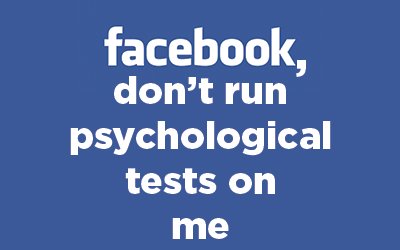Thanks for taking a stand
Now that you’ve taken action to stop Facebook’s psychological experiments, tell your friends to take action too by sharing this.
The Washington Post and the Guardian have reported that Facebook conducted a psychological experiment to see if they could manipulate the emotional state of nearly 700,000 people in secret.
Sign this petition to send the demands below to Facebook.
Fight for the Future and Center for Rights will contact you about future campaigns. Privacy Policy

Facebook’s experiment is unethical and their privacy policy and data use policy do not meet the requirement of informed consent. We demand that Facebook:
1. Inform the people affected by this experiment that they were participants.
2. Refrain from conducting any similar studies and make it clear in the terms of service, data use policy, and privacy policy that these types of experiments are prohibited without informed consent.
3. Disclose if any other similar experiments have been or are being conducted.

Last week, more than 100,000 people protested against Facebook's new intrusive surveillance policy of using browsing histories and other data for advertising. Although free services like Facebook run on a business model of running targeted ads, people are becoming more concerned with how companies handle their personal data. The amount of individual harm Facebook is capable of grows rapidly as it taps deeper and deeper into our browsing and personal data. And even as these services evolve, it's unethical for a company to exploit its users as psychological test subjects for profit.
Facebook just released a study on a psychological experiment they conducted in 2012 to see if they could manipulate our emotional states. Nearly 700,000 Facebook users had their newsfeeds tweaked by Facebook to cause emotional responses. The study itself was overseen by a Facebook data scientist employed to keep the service profitable by staying "relevant and engaging". None of these users were informed about Facebook’s experiment prior. To make matters worse, law professor James Grimmelmann of the University of Maryland argues that the psychological experiment might have been conducted illegally due to the lack of disclosure and consent from the participants as mandated by federal law.

Facebook’s test poses serious questions about the company’s ethics and commitment to its users. This isn't the first time Facebook has been caught lying to its users; in 2011, the FTC ruled against Facebook for deceiving its users about the personal information it shares and makes public. Although a Cornell professor was involved in helping analyze the data, even the Cornell ethics board did not pre-approve the experiment. The company’s defense in conducting this study is that they argue users technically have already given consent in its privacy policy and data use policy. But Facebook changed its data use policy to allow for research four months after the experiment had already happened. Simply inserting legal terminology into a privacy policy or data use policy does not meet the standard of having informed consent from the participants.
Not only is the experiment unethical, but there is a dangerous uncertainty to the ramifications of emotional manipulation. The danger lies in the fact that a large portion of those users could have been emotionally fragile during the experiment. In addition, it's been reported that some participants could have been under the age of 18. Facebook's decision to move forward with the experiment could have triggered serious emotional trauma to unaware participants. The company has crossed a line and it needs to acknowledge the huge error it has made with this study.

Change your profile picture to this image to spread the word about Facebook's unethical experiment.
If we can spread this profilepicture across the Internet, it'll send a message to Facebook loud andclear: don't run tests on us.
National Academy of Sciences. "Experimental evidence of massive-scale emotional contagion through social networks". Read More
TIME. “Facebook Totally Screwed With a Bunch of People in the Name of Science”. Read More
The Guardian. "Facebook emotion study breached ethical guidelines, researchers say". Read More
The Guardian. "Facebook reveals news feed experiment to control emotions”. Read More
USA Today. “Facebook's controversial study: What you need to know”. Read More
Washington Post. "Cornell ethics board did not pre-approve Facebook mood manipulation study". Read More
Forbes. Facebook's Emotion Study Was All About Keeping Us Addicted To Facebook. Read More
Forbes. "Facebook Added 'Research' To User Agreement 4 Months After Emotion Manipulation Study". Read More
Wall Street Journal. "Facebook Study Sparks Soul-Searching and Ethical Questions".Read More